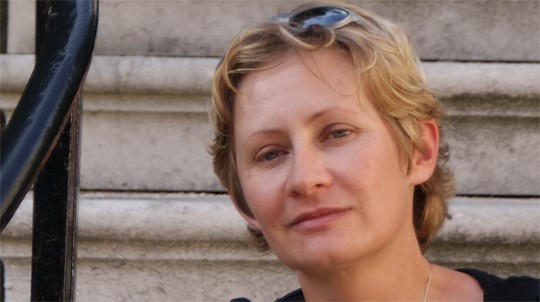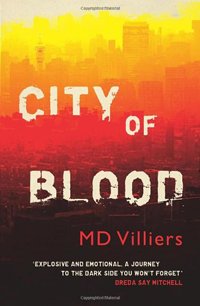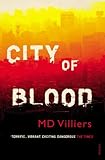After stints in marketing and recruitment, as well as a period working as a tennis coach, London-based ex-Johannesburger MD Villiers turned her hand to crime writing. Last month we looked at her gripping, bloody, yet still uplifting debut, City of Blood. The book explores the dark underbelly of her home town back in South Africa. Back in 2007 it was shortlisted for the Crime Writers Association’s Debut Dagger award, and has finally appeared in print and on Kindle here in the UK thanks to Harvill Secker. It isn’t hard to see why it caught the judges eyes, as it combines the thrust of a compelling crime narrative with the emotional draw of a coming of age novel. The author was kind enough to take time out to join us as Crime Fiction Lover today…
Tell us a little about City of Blood…
It’s a story about three young men, a policeman called Adrian, a gangster called Progress, and Siphiwe, the victim of a vigilante attack. After helping a woman on the street, Siphiwe gets caught between rival gangs and the police, and has to find a way to survive and protect those he loves.
Where did the inspiration for the book come from?
I read an article in a South African paper about a vigilante attack on two men. One of them, Sabelo Ntose, died but managed to save the other man’s life. The story left my asking questions about justice and vigilantism, and I also wondered what happened to the survivor. That’s where Siphiwe’s story starts.
What does Johannesburg give you as a setting?
I’m fascinated by Johannesburg, its history, and its reputation – stories of crime and violence seems to be part of the city. The inner city suburbs like Hillbrow are still pretty dangerous, but Jo’burg is also Africa’s city of gold and people flock to it from all over the continent.
It’s a murky moral landscape you’re working in, even the police can be corrupt. What challenges did this present you with?
There is police corruption, but there are also good cops trying hard to get the job done under difficult circumstances. I think it’s important to understand what the South African police are up against. Adrian and Robert are good policemen, but Robert has a darker side, and a tendency to take the law into his own hands.
Has living in London influenced your view of South Africa? Do you feel freer to write about the country since leaving?
When I lived in SA I wanted to set my novels in Europe or America, but coming to London made me realise just what South Africa has to offer for me as a writer. It seems easier to write about South Africa, looking in from the outside, although it is much harder to do research from a distance. I do like to visit the places I write about.
Despite the subject matter there’s a sense of optimism in the book. Was it important to you to have this balance?
Yes, very important. To me, South Africa has always been a country of hope. Even among the poorest, there seems to be a spirit of optimism, an ability to get on with things and make the most of opportunities. I tried to capture something of the way people live their lives in the face of crime and poverty.
How did the Debut Dagger short listing affect you as a writer?
Getting shortlisted for the Debut Dagger was a huge confidence booster and it I think the CWA is doing a great job encouraging new writers. Making the shortlist taught me a lot, and certainly also taught me I need more than just three good chapters to get a publisher.
What’s coming up next for you?
Much to look forward to. Crime in the Court tomorrow and Harrogate in a few weeks. I’ll be talking on the South of the Equator panel with Lauren Beukes, Helen Fitzgerald, and Michael Robotham I’m also working on my second novel, a thriller set on the west coast of South Africa.












